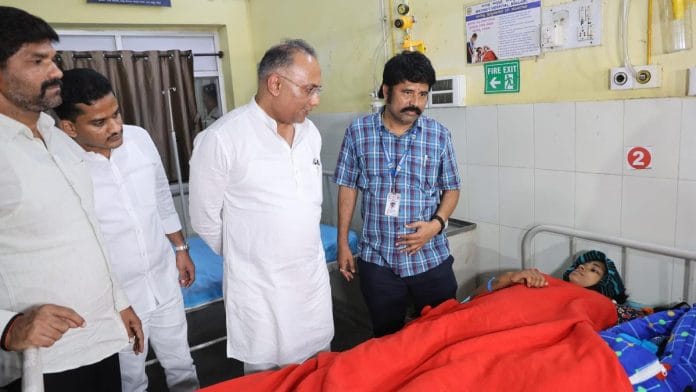Bengaluru: The Karnataka government is attempting to restructure the drugs control department and take a fresh look at current procedures in its medical facilities, including tendering and auditing, to put in place checks to avoid a repeat of incidents such as the maternal deaths in Ballari.
The efforts include the auditing of deaths of new mothers in the immediate past to probe if any of them were caused by substandard or contaminated drugs, and bringing the Karnataka State Drugs Control Department under the commissioner of food safety.
Calling the drugs control department’s functioning “non-transparent”, Dinesh Gundu Rao, the state’s health & family welfare minister, said the cabinet had decided to bring it under the purview of the food safety commissioner.
“The drugs control department is a closed organisation. It’s like those who work within the organisation stay within the organisation. We need somebody from the outside to look at it,” Rao told ThePrint.
He added that a committee led by an IAS officer has been formed to look into existing procedures that can help improve quality checks and the tendering process.
“We have changed a few things, including the tendering process. From a one-year tender, we are now shifting to a two-year tender for procuring medicines,” the minister said.
The Karnataka government has been under immense pressure to bring in more accountability after a spate of maternal deaths were reported at the Ballari district hospital last month. The role of a substandard intravenous fluid in the matter is being probed.
Even though the maternal mortality ratio (MMR) has seen a steep decline across India, concerns about the procurement of substandard or contaminated drugs have been on the rise.
According to the United Nations Maternal Mortality Estimation Inter-Agency Group’s 2020 report titled ‘Trends in maternal mortality 2000 to 2020’, India’s MMR has declined from 384 in 2000 to 103 in 2020.
The average annual rate of reduction in global MMR during the 2000-2020 period was 2.07 percent while India’s MMR declined by 6.36 percent, according to a government statement in February.
Maternal deaths in Karnataka declined from 662 in 2019-2020 to 348 in 2024-2025 (up to November), according to data released by the state government.
Also Read: Inside India’s shadow pharma industry — dingy drug units, cash payments, poor inspection
‘Yet to determine cause of deaths in Ballari’
The Karnataka government has announced compensation of Rs 5 lakh to the next of kin of the women who died in Ballari last month.
The Opposition, however, is trying to pile on pressure on the government over the deaths, linking all reported maternal deaths in the state to contaminated drugs.
Harsh Gupta, principal secretary, health & family welfare, told ThePrint that it is yet to be determined whether contaminated drugs were the cause of the deaths in Ballari.
“Any death which took place, in this month or earlier months, is being linked to this (Ballari tragedy),” Gupta said.
He added that of 192 batches of Ringer Lactate IV fluid—suspected to have had a hand in the deaths and which was procured from West Bengal-based Paschim Banga Pharmaceutical—22 have failed tests, around 65 have passed it and the remaining are yet to be examined.
He said that drugs made by this particular supplier were used earlier too, but the government has now held back its usage as well as of two other drugs from the same supplier.
ThePrint had earlier reached Paschim Banga Pharmaceutical over email for its response on the episode. This report will be updated if and when a reply is received.
Apart from probing the Ballari deaths, the committee formed will dig deeper into other cases of maternal deaths too, to check for lapses.
“For this exercise, the committee will probe whether there are any suspicions. They will talk to doctors from those hospitals, go through the audit analysis, and try to check (if there is room for suspicion). Doctors from local hospitals may not have reported such deaths but now we will look into it,” Gupta said.
He added that cases of pregnancy being classified as “high-risk” or with complications before or after surgery would also be probed.
According to Gupta, over the past two decades, several checks have already been put into place to improve health services as well as avoid lapses, either by doctors, the medical facility or via contaminated drugs.
He said that as of now, maternal deaths are audited and the case reported to the head office of the health department, which probes anything suspicious. There is also a district-level committee that looks into such cases, he added.
“All those systems are in place. We are having a relook at them… taking it very seriously, especially after this unfortunate incident. We want to see if there is scope for improvement,” he told ThePrint.
(Edited by Nida Fatima Siddiqui)
Also Read: India has a substandard, fake drugs problem. Lack of recall law, scrutiny is making matters worse






